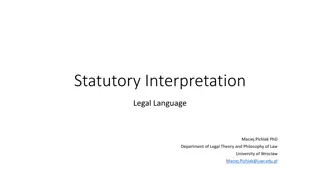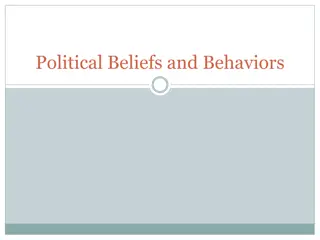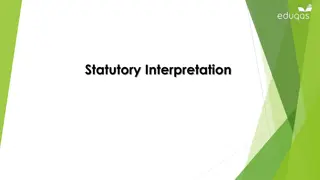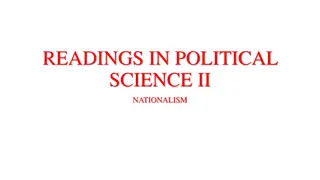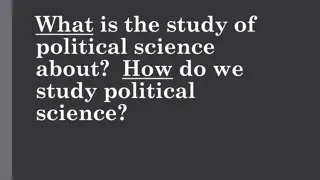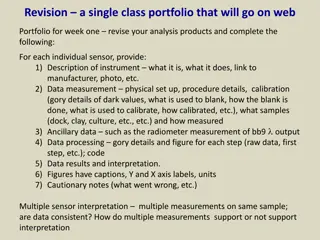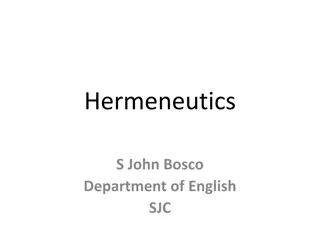Reappraising Political Theory: Interpretation and Context
In Terence Ball's seminal work, "Reappraising Political Theory," he puts forth the hypothesis that continual reinterpretation and reinvention of political theory are essential for expanding our horizons of knowledge and wisdom. By engaging with the need for interpretation and exploring different strategies, Ball challenges the notion of studying classical texts and advocates for a problem-centric, multi-method approach in the study of political thought. Emphasizing the importance of both textual and contextual analyses, Ball's work highlights the necessity of continuous interpretation in understanding the history of political thought.
Download Presentation

Please find below an Image/Link to download the presentation.
The content on the website is provided AS IS for your information and personal use only. It may not be sold, licensed, or shared on other websites without obtaining consent from the author.If you encounter any issues during the download, it is possible that the publisher has removed the file from their server.
You are allowed to download the files provided on this website for personal or commercial use, subject to the condition that they are used lawfully. All files are the property of their respective owners.
The content on the website is provided AS IS for your information and personal use only. It may not be sold, licensed, or shared on other websites without obtaining consent from the author.
E N D
Presentation Transcript
Introduction Ball s major work, Reappraising Political Theory (1995) is taken as a major contribution in the theory of interpretation. His major hypothesis in this book is that if the horizon of knowledge and wisdom is to be expanded ceaselessly, we have to engage ourselves in the task of reappraising, reinterpreting and even reinventing political theory on a continuous basis. Primarily he takes the following issues for his interpretation: a) Need and inescapability of interpretation; and b) Strategies for interpretation.
Need and the Way to Study a Classic Ball engages himself with the basic questions raised by scholars belonging to different schools of thought as regards why at all study all these classical texts as it is done by succeeding generations. There are a number of groups who raise such questions. The earliest group to raise such doubts was the scientific-minded behaviourist from among the discipline of political science. Their main contention was that the pursuit of such studies on long-dead thinkers comes in the way of developing a scientific theory of political behaviour.
Need and the Way(Cont.) Subsequently, the proponents of analytical political philosophy have joined hands with them. They, in turn, want political scientists to focus their attention on pressing problems of our times, instead of concentrating on the task of interpreting the old classics. The multiculturalist is another group to have similar objections to the study of the classics. They project themselves as a group committed to the cause of the dispossessed, viz., women, black, gays and minorities.
Need and the Way(Cont.) Their primary objection is that such studies of the classics only legitimize and promote the interest of a small section of the elite ( the white male) at the cost of the marginalized millions. To sum up, all these groups look at the study of the classics as being nothing other than intellectual luxury and extravagance. Terence Ball is not a protagonist of either of the two contending groups-the texualist or contextual school. For Ball both these groups err as they take extreme positions.
Need and the Way(Cont.) Ball is as much concerned with the text as with its wider context including the reader s response. Terence Ball s primary formulation is that both the textual and contextual approaches could be fruitfully used depending on the nature of the interpretative problem. For him these different strategies are not even antagonistic, much less mutually exclusive. Hence, a problem-centric and multi-method approach could have to be evolved for the study of the classics. Such an approach calls for a reappraisal and a revisionist study of the history of political thought. Hence continuous interpretation of the history of political thought is inevitable.
Inescapability of Interpretation Terence Ball strongly supports the opinion that if we want to understand a text, we have hardly a choice like interpreting or not interpreting it. The fact of the matter is that the task of interpretation is inescapable in such a process. He substantiates this point by pointing out that human being has been engaged in the business of interpretation from the very beginning of one s existence. The entire spectrum of human existence including life, liberty and happiness came within the purview of interpretation.
Inescapability of Interpretation (Cont.) Terence Ball goes on to add that in human history a parallel opposite trend has also existed disfavouring the very idea of interpretation. It insisted on the idea if sticking to the text. On the other hand, another section was for recovering and retrieving the authorial intention and perusing the text in its light. Attempts at interpretation were to be discarded in both the cases. Such discarding of interpretation was more popular in case of legal, religious and literary texts. Their primary argument was that the originality of the text, its original intent, gets discarded in the process of interpretation.
Inescapability of Interpretation (Cont.) The case of Martin Luther, founder of the Protestant sect of Christianity, is cited as an example to substantiate this point. Martin Luther went to the extent of describing all interpretations of the Holy Bible as scum , for it succeeded only in distorting its message. Ironically enough, Luther himself added his own preface to the Holy Bible which he defended on the ground that it was needed to clear off all distortions brought about by earlier interpretations. Ball takes Luther fulminations against all interpretative enterprises as in itself being a kind of interpretation.
The Act of Interpretation: An Ontological Category A number of modern scholars are also of the opinion that the act of interpretation is inescapable. Thus, for Heidegger the act of interpretation falls in an ontological category, whereas Gadamer looks at it as ontological necessity . Gadamer argues that the text we read are already interpreted and invested with meanings on account of our linguistic and cultural context. Thus, we are already in possession of our standpoint (prejudices) of looking at the text and even the wider world and its creatures.
The Act of Interpretation: An Ontological Necessity However, Gadamer does concede that such a standpoint keeps on changing depending on the nature of the historical context it is situated in. In other words, we keep extending our horizon as we come across contrarian horizons. In the process, we try to make both the horizons compatible. And that is what Gadamer calls the fusion of horizons . Such a fusion has a very positive contribution to make. While appreciating the differences, we are also able to see the common ground. Thus, for Gadamer, the act of interpretation is an integral part of human existence.
The Act of Interpretation: An Ontological Necessity (Cont.) We keep on interpreting actions, practices and utterances of other people. However, in our daily life, we are not conscious of it as they come as single seamless activity . When we interact with alien culture/ language, we have difficulties in understanding the things around us. Hence, we need translation which itself is an interpretative enterprise. In the process, alien perspective on life and the world are made familiar and accessible to us. Such an experience is also true in the field of political thought, viz., the classical political texts, drawn from different ages and different cultures.







